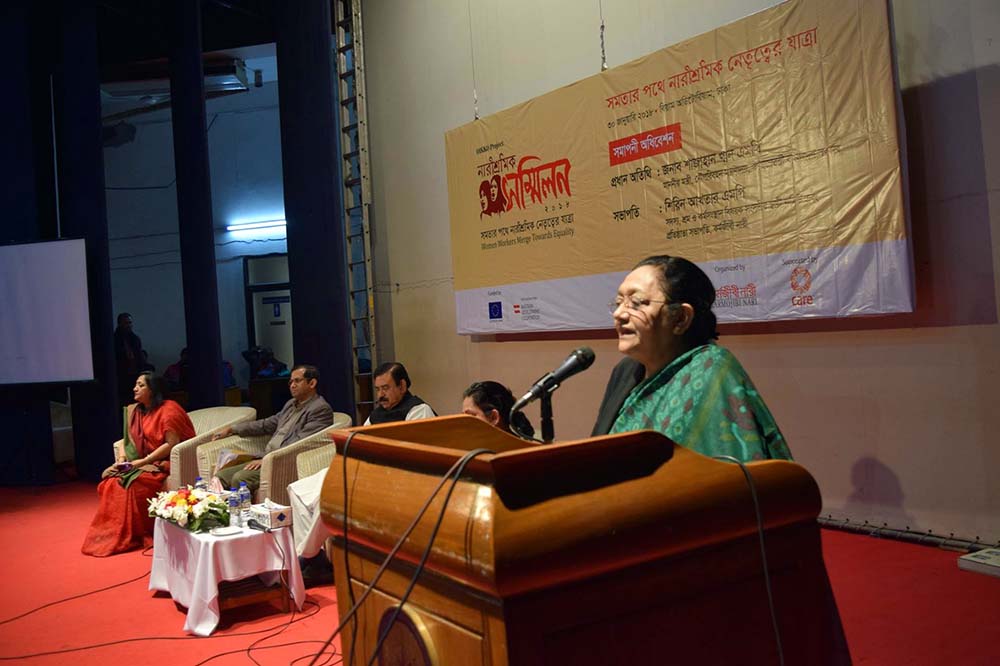Background
Karmojibi Nari (KN) is a non-profit, non-government women-headed organization in Bangladesh working since 1991 still marching on the road to ensure women rights, dignity, power and authority.
Background
Karmojibi Nari is a non-political and politically conscious, and non-communal democratic minded non-governmental development organization. Karmojibi Nari is registered with the Republic of Bangladesh Government’s NGO Affairs Bureau and Ministry of Women and Children’s Affair.
Karmojibi Nari was founded with the aim of initiating a new and timely movement to create a society free of repression, persecution or discrimination with the hope of materializing the ideals of our glorious independence war. The organization is not a typical women’s organization, as the name suggests rather it is an organization specifically for women, which besides striving for women workers’ welfare is dedicated to ensuring the right, respect and authority of women as well as the workers and labourers. Through its continuous struggle to ensure increasing presence of women workers in workers’ and women’s movements Karmojibi Nari is moving forward successfully. The organization has, to a certain extent, created new women leadership, along with freeing the workers’ movement from the grip of upper-classes and elites and the women’s movement from the curses of patriarchy.
The newly-found organization’s first workplace was in Tongi — an area devastated by the World Bank and International Monetary Fund’s so-called supervision. Directed towards reorganizing the workers’ movements, the main aims of its activities were to create awareness among the women workers and creating women leadership in trade unions and other organizations. Beyond the boundaries of Tongi industrial area, Karmojibi Nari’s offices were set up in other factories and localities of the capital city Dhaka.
Besides finding ways to fight various prevailing problems of women workers in their factories and at their localities there was added stress on reforming related laws and regulations at the national level, and/or enact new one and effective implementation of the laws which has serious impact upon the women workers. From 2003, a serious initiative was taken to amend the prevailing labour laws and after a rigorous advocacy labour law, 2006 was enacted.
Besides, from 2005 the organization took initiative of drafting labour law for the agriculture workers — the largest section of non-formal workers in Bangladesh. It is mentionable that in our country, only the nationalized and institutionalized labourers fall under the purview of the existing labour laws, but apart from them there are more than 85% laboures of urban and rural informal labourers for whom there are no specific labour laws or regulations. Karmojibi Nari along with other human rights organization worked hard to introduce a new Policy for the domestic worker titled ”Domestic Worker Protection and Welfare Policy, 2010”. The organization is also working with other HR/WR organizations to enact a separate law to prevent GBV at workplace according to the verdict of High Court given in 2009.
Another landmark initiative of Karmojibi Nari was to create leadership among the unorganized rural women workers especially the agriculture worker. Since then Karmojibi Nari involved with the women workers of tannery, construction, migration, waste and sanitation, sea fish processing, domestic and household sectors.
The women workers who have organized under the flag of Karmojibi Nari also playing significant roles in furthering women’s movement in Bangladesh. In 1995 during a mass upsurge against the gang rape of a teenaged domestic help Yasmin in Dinajpur district by a group of police officers Karmojibi Nari and its members directly involved in this movement at the national level. Till today the organization is very much active against any kind of VAWG occurred in the workplaces, public places and also in family level.
Karmojibi Nari also playing a very significant role to ensure political empowerment of women through increasing reserved seats for women in the parliament and also all other bodies like Trade Unions – to increase the representation of women. Since 2004 the organization was actively involving to get the Women Development Policy (first adopted in 1997) which was finally enacted in 2011 after a long and rigorous women movement against the religious fundamentalists and armed extremists.

1st May 1991
Founder President
Shirin Akhter, Former MP, People’s Republic of Bangladesh
Legal status
Department of Women Affairs of the GoB. Reg. WAO/DAC/157/96; Dated: 21/11/96
NGO Affairs Bureau Reg. 1199; Dated: 16/10/1997
Tax no: 461197868774
VAT (BIN) no. 002838186-0401
